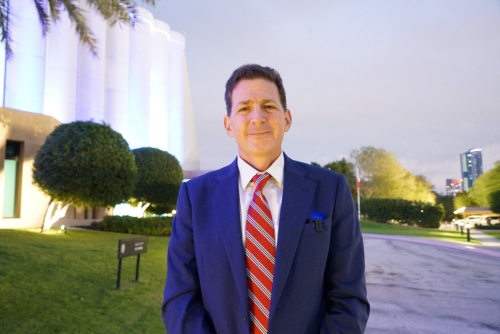'Digital technology and innovation key to advance healthcare sector'
TDT | Manama
The Daily Tribune – www.newsofbahrain.com
Reported by Julia Cassano
Digital health continues to push the boundaries of how healthcare is delivered, and has the capacity to create breakthroughs that can advance countries’ health sectors world-wide, delivering higher quality care to more people.
“Technology and innovation are crucial to advance health sectors worldwide,” said Professor Eyal Zimlichman, chief innovation officer and chief transformation officer at Sheba Medical Centre in Israel, in an exclusive interview with The Daily Tribune.
“As Sheba Medical Centre in Israel and The King Hamad American Mission Hospital in Bahrain continue to partner together to transform the use of technology in the health sector, we can expect to see improved care to the public, and extended care from hospitals to the home environment.”
Sheba Medical Centre contains an innovation arm called ‘ARC’, which is a global innovation arm working in 15 different countries, bringing together all the players in digital for the goal of redesigning healthcare and improving patient care using innovation to provide real value to patients which has now been brought to the Kingdom.
Prof Zimlichman said: “Sheba Medical Centre and King Hamad American Mission Hospital work together to create new ways of thinking and determine the most proactive ways to transform the future of health through technology. Israel offers advanced technology that will offer transformed care delivered here in Bahrain.
“The King Hamad American Mission Hospital is a hospital built in that fashion, as they anticipate the future of health by focusing on prevention of care, primary care, and precision medicine. This is the type of advanced medicine that Sheba Medicine Center can bring into the Kingdom for Bahrain to be showcased as a model to the world, as well as advancing their healthcare sector for the future.”
New policy reforms for healthcare insurance in the Kingdom will help Bahrain adapt and advance with new technology, and extend care to the population. “We are not looking for technology that is more expensive, but rather on technology that allows us the opportunity to provide a higher level of care at a lower cost,” he said.
Digital health provides direct support to doctors to assist in the diagnosis and treatment of patients and provide higher-quality decision-making processes. Artificial intelligence and technology will fundamentally change the delivery of healthcare in society, providing effective and efficient decision making by doctors, at a lower cost.
“Telemedicine or remote care provides us the ability to treat patients from afar, which will solve many of our problems as the vast geography limits the number of people we are able to provide high quality of care to. However, using technology will allow us to extend the care, beyond the hospital to the home environment, and to other countries where there can be a lack of physicians or nurses,” said Zimlichman.
“Additionally, doctors can experience an information overload, and this is where they would need help from technology to provide the best possible care for their patients. There is a variety of research and evidence being conducted globally, and the knowledge base of healthcare has grown tremendously.”
Over the next 10 to 20 years, technologies such as AI will build on the work already being performed by doctors by helping to improve decision support, read CT scans, pathology, or any type of imaging. In the past, doctors have had to rely on the human eye to look at the pathology and understand the information. However, by using technology, AI will improve current work to better understand the imaging.
“The world suffers from an inequality of health, and depending on where you live, this can affect the quality of care you receive. Using technology in the healthcare sector can increase higher quality of care to higher numbers of people, and we can see this with delivering care to the home,” Prof Zimlichman said.
“We will see much more of the home environment changing into a health environment. This is what King Hamad American Mission Hospital is looking to do with the help of the ARC global exquisite system coming out of Sheba Medical Centre.”
Prof Zimlichman holds an extensive background consisting of a career in being an internal medicine physician, operating between Israel and Boston for the past 20 years, working on healthcare innovation, research, and strategy focused on transforming healthcare systems.
Related Posts

